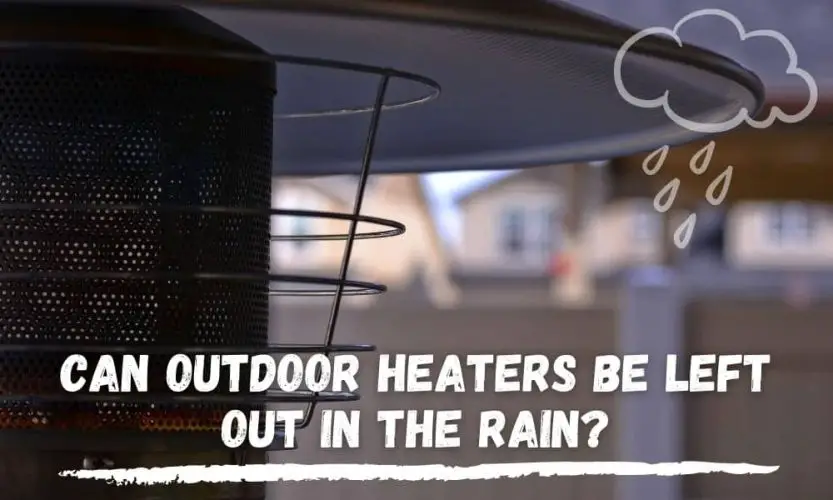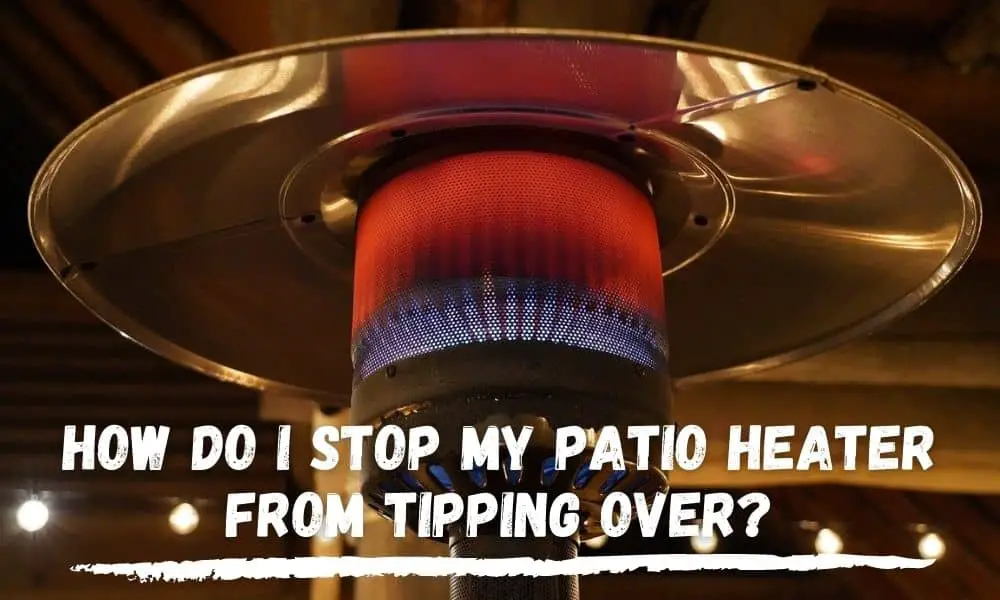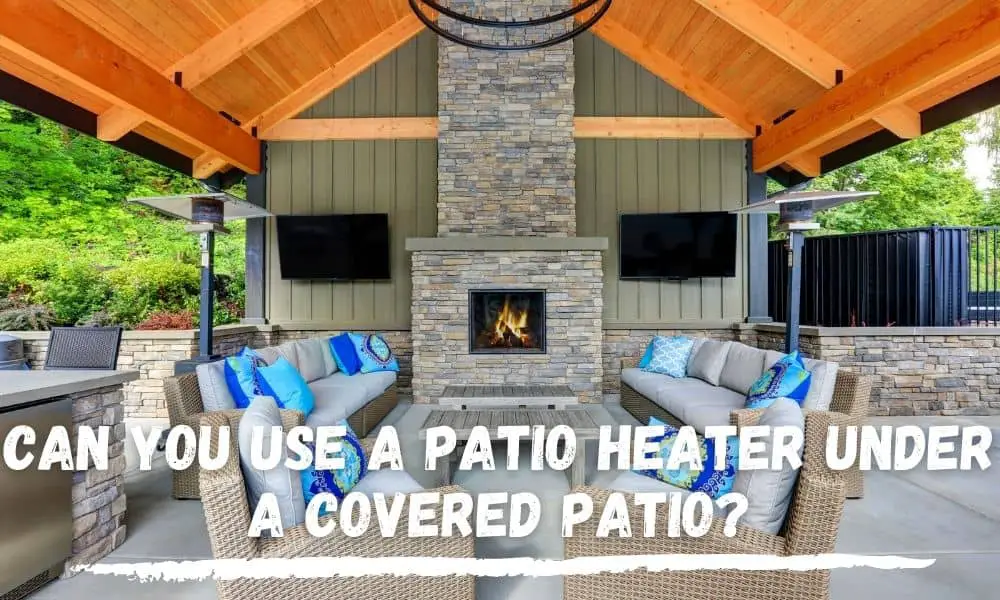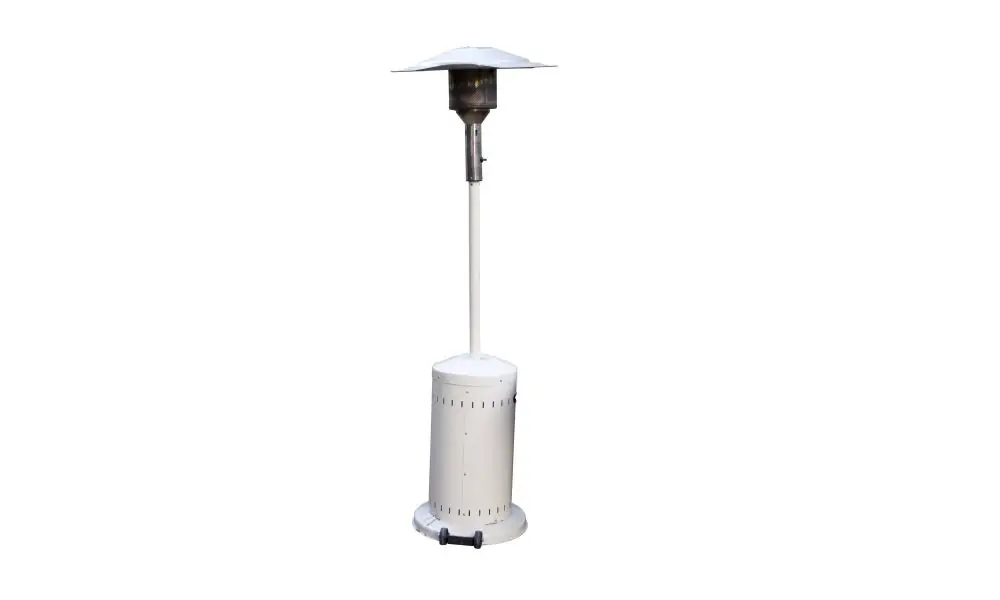Outdoor heaters are a lifesaver. They ensure the cold season doesn’t stop you from enjoying the outside experience. They are a good alternative to building a campfire if you don’t have space or the wood needed. But how far can they take the outdoor life?

Can outdoor heaters be left out in the rain? Outdoor heaters are designed to withstand drizzling, so it will be okay if it is a one-time thing. It’s good to note when you expose the heater to the rain frequently, you affect the lifespan and how it performs.
Quick Navigation
Can You Use Patio Heaters in the Rain?
Outdoor heaters are designed to withstand water exposure. Note that neither the infrared heaters nor any other electric heater is waterproof.
So, in this case, electric heaters should not be left in the rain. Propane heaters and other gas heaters can withstand the rain, but the rain will affect how they work and how long they serve you.
On the other hand, you can consider getting a cover for the outdoor heater to shield your heater from rain.
In most cases, outdoor heaters are so heavy. Carrying them in and out is a lot of work and almost impossible if you are alone. Thus, most of the time, they are left outdoor. Apart from that, you may be away from home when it rains, and it ends up being rained on. This is where a patio cover for the heater will save the day.
There are different types of outdoor heaters and are categorized into three types. Each patio heater has its resistance to rain, as indicated below:
a) Fixed Gas Outdoor Patio Heater
This is an outdoor gas heater designed to operate from the outdoor but is fixed next to the natural gas lines supply area. For this type of heater, there is no way to move it in case of rain. The manufacturer has considered that fact when designing, and in that case, they are created to be rain and snow resistant.
But on the other side, the heater may be built with materials that, with time and too much exposure to the rainwater, the material will start wearing off and affect its lifespan. In this case, it would be wise to get the heater a cover to protect it from excess rain and snow to ensure its performance remains the same for a long time and last for longer.
b) Portable Gas Heater
Portable gas heaters are patio heaters that use gases like propane. A portable gas heater is designed to withstand rain and snow. It is advised to move them indoors or under a sheltered space, when it rains or snow.
Since gas-based heaters are portable, the manufacturers considered portability in designing it. Hence, it should not be an issue moving the portable gas patio heaters from one point to another.
But since some makes are too heavy to move, i.e., the pyramid gas-based patio heater, consider getting a cover for them, so you don’t have to move them.
Before moving an outdoor patio heater, confirm whether it is cold because, after use, it can be hot and burn you. Therefore give it time to cool before moving it around.
c) Electric Infrared Heater
Electric infrared heaters use electricity. As mentioned earlier, electrical appliances should not get exposed to the elements of rain.
On the positive side, they are not as heavy as the gas-based heaters as they don’t have a gas tank or propane cylinder, neither are they connected to a natural gas line; hence moving them around is easy.
Can I Leave My Patio Heater Outside?
Patio heaters can be heavy, thus making it hard to keep taking them inside and outside when you need them. Can you leave the patio heater outside?
Most heaters are designed to withstand almost all weather conditions. But if you are planning to leave your patio heater outside at all times, it’s good to note the following things.
When outdoor patio heaters are subjected to much rain, it will affect their longevity as some parts may get affected by the excess water.
In most cases, heaters are useful during those cold months between December and February. To ensure the patio heater serves you well in the next cold season, you should consider storing it well after the cold season is over.
Storage Steps for Outdoor Patio Heaters
The first step is to disassemble the outdoor heater. A propane patio heater can’t get stored when it is still connected to its propane tank. Leaving it connected can be a safety hazard, and also the pipe connecting the two may spoil when left for an extended period without use. To ensure you do it right, refer to the manufacturer manual.
The second step involves cleaning outdoor heaters. As it was exposed to many components, it may have bugs and rust. All you need is a damp cloth to wipe it all around. If it has rust, apply oil or petroleum jerry to prevent further rusting. Don’t take out the power washer at any point.
The next step is how to store the patio heaters. You need to get a clean, dry area to keep outdoor heaters. The propane tank is stored differently and has its guide to ensure your safety as bad storage can cause a fire.
When the cold season comes back, it’s time to get patio heaters together. Make sure you go through the manufacturer guide and follow all the guidelines to ensure the safety of the people.
Before getting it together, ensure all the gaps and cracks are repaired to ensure no leakage and ensure it is safe to use. If you are not sure of anything, contact the manufacturer or any other professional to help you with it. Don’t search for information online without expert help.
Can You Put a Patio Heater Under a Covered Porch?
The thought of spending a cozy evening on your patio arouses joyful emotions. However, if you have a covered patio, you may be concerned about the safety of using outdoor heaters. Challenging weather conditions prompt homeowners to buy patio heaters that are easy to operate.
With high-quality and certified outdoor heaters, you only need to follow a few safety precautions. Whenever you want to position your patio heaters for warmth in your covered patio, having the following in mind is a good idea:
Clearance
When using gas-based heaters, you must make sure you allow enough clearance from the patio’s cover. As you mount gas-based heaters, leave an allowance of about two feet between the heater’s head unit and the patio’s cover.
The essence of doing this is to ensure the flames don’t get to the flammable material used to cover the patio. Even slight sparks have the potential to start a fire that will inevitably ruin your evening and cause a fire that even the rain can’t stop.
Patio’s Ventilation
The second most important consideration is the airflow in your patio through ventilation. How have you covered your patio? If you have designed your outdoor patio with more ventilation space, you are in an advantaged position of using propane patio heaters.
On the other hand, covering your patio extensively, leaving little ventilation spaces inhibits proper heating. The carbon monoxide emitted by the patio heater is fatal if inhaled in excess.
For this reason, if you want to keep your outdoor party going even with the rain, consider your patio’s ventilation. A good idea in cases like this is to use an electric patio.
Material Used in Construction
The material you use in constructing the outdoor patio has a significant impact on using a patio heater. If you use more flammable material, you must consequently get more cautious. On the other hand, less material that is less prone to fire is a good alternative.
Whenever you use an outdoor heater that produces smoke, you risk staining your patio’s cover. After a few months of continued use, you may start noticing black spots created by the soot.
Why Won’t My Outdoor Heater Stay On?
Does your outdoor heater keep on switching off? That must be frustrating. If there is snow near your outdoor heater, you may begin to think that that would be the issue, but you aren’t sure.
After inspecting the air heating equipment, you don’t spot any water on it from the rain. So, what is the problem?
There are several reasons why your outdoor heater is continually going off. Let us explore these reasons:
Natural Elements
When raindrops land on your outdoor electric heater, they can go off. Electric heaters mostly suffer when they come into contact with the rain. If you want to avoid the stress of switching the device on, position it under the cover where rain can not get to it.
Additionally, the wind can blow out your outdoor heater and expose you to the harsh night cold. Invest in windscreens designed for barricading patio heaters without interfering with the heat convection. Also, stay clear of these natural elements.
Accumulated Dirt On the Heater
Some people forget to take care of their patio heaters. As a result, dust is likely to settle on the outdoor heater. Other forms of dirt accumulated over time on warmth-generating devices will damage it.
Consequently, a need for regular heater maintenance arises. First, switch the device off. Second, wet a rag and use it to remove it from the patio heater’s top to bottom. To clean spider webs and dust, look for a clean towel and use it to wipe the outdoor heater gently.
Compromised Thermocouple
When you use your heating device to give you the much-needed comforting heat, maintenance is required. Due to the patio heater’s outdoor use and ability to attract mosquitoes, they get sucked in. Further, these insects block vital parts of the heater, causing trouble with its heating system.
Therefore, you will have to remove these intruders. Loosen the nuts used to screw in the thermocouple and thoroughly inspect it removing any compromising contaminants. With a clean thermocouple, gas will have an interrupted flow resulting in insufficient heating.
Related: Thermocouples on patio heaters
Loose Gas Valve
As you manipulate your outdoor patio heaters, you will loosen the valve if you use more force than needed, even unconsciously. For this reason, if the knob gets loose, your heating equipment will have trouble functioning optimally.
You will therefore need to tighten the gas valve using a wrench. However, make sure it’s not too tight to reduce the chances of it breaking.
Gas Leak
Outdoor gas patio heaters are prone to gas leaks after being used for a long time. For this reason, you should always inspect the heater’s gas hose for leaks.
Seal any holes you find to give your outdoor heater the power it needs. Operating in full power will enable it to efficiently supply you with heat as you enjoy your outdoor activities.
Conclusion
We all want a commodity that will serve us well for a long time. As seen above, most outdoor patio heaters can withstand water, but it will affect their lifespan.
So, save a few minutes from getting it in or get a patio cover to protect it from rain.




